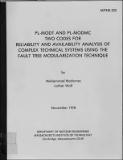| dc.contributor.author | Modarres, M. (Mohammad) | en_US |
| dc.contributor.author | Wolf, Lothar | en_US |
| dc.contributor.other | Massachusetts Institute of Technology. Department of Nuclear Engineering | en_US |
| dc.contributor.other | U.S. Nuclear Regulatory Commission | en_US |
| dc.date.accessioned | 2014-09-16T23:37:00Z | |
| dc.date.available | 2014-09-16T23:37:00Z | |
| dc.date.issued | 1978 | en_US |
| dc.identifier.uri | http://hdl.handle.net/1721.1/89735 | |
| dc.description | "November 1978." | en_US |
| dc.description | Includes bibliographical references | en_US |
| dc.description.abstract | The methodology used in the PL-MOD code has been extended to include the time-dependent behavior of the fault tree components. Four classes of components are defined to model time-dependent fault tree leaves. Mathematical simplifications are applied to predict the time-dependent behavior of simple modules in the fault tree from its input components' failure data. The extended code, PL-MODT, handles time-dependent problems based on the mathematical models that have been established. An automatic tree reduction feature is also incorporated into this code. This reduction is based on the Vesely-Fussell importance measure that the code calculates. A CUT-OFF value is defined and incorporated into the code. Any module or component in the fault tree whose V-F importance is less than this value will automatically be eliminated from the tree. In order to benchmark the PL-MODT code, a number of systems are analyzed. The results are in good agreement with other codes, such as FRANTIC and KITT. The computation times are comparable and in most of the cases are even lower for the PL-MODT code compared to the others. In addition, a Monte-Carlo simulation code (PL-MODMC) is developed to propagate uncertainties in the failure rates of the components to the top event of a fault tree. An efficient sorting routine similar to the one used in the LIMITS code is employed in the PL-MODMC code. Upon modularization the code proceeds and propagates uncertainties in the failure rates through the tree. Large fault trees such as the LPRS fault tree as well as some smaller ones have been analyzed for simulation, and the results for the LPRS are in fair agreement with the WASH-1400 predictions for the number of simulations performed. The codes PL-MODT and PL-MODMC are written in PL/l language which offers the extensive use of the list processing tools. First experience indicates that these codes are very efficient and accurate, specifically for the analysis of very large and complex fault trees | en_US |
| dc.description.sponsorship | Sponsored by the NRC | en_US |
| dc.format.extent | viii, 210 pages | en_US |
| dc.publisher | Cambridge, Mass. : Dept. of Nuclear Engineering, Massachusetts Institute of Technology, [1978] | en_US |
| dc.relation.ispartofseries | MITNE ; no. 222 | en_US |
| dc.subject.lcc | TK9008.M41 N96 no.222 | en_US |
| dc.subject.lcsh | Decision trees -- Mathematical models | en_US |
| dc.subject.lcsh | Monte Carlo method -- Mathematical models | en_US |
| dc.title | PL-MODT and PL-MODMC : two codes for reliability and availability analysis of complex technical systems using the fault tree modularization technique | en_US |
| dc.type | Technical Report | en_US |
| dc.identifier.oclc | 857419210 | en_US |
